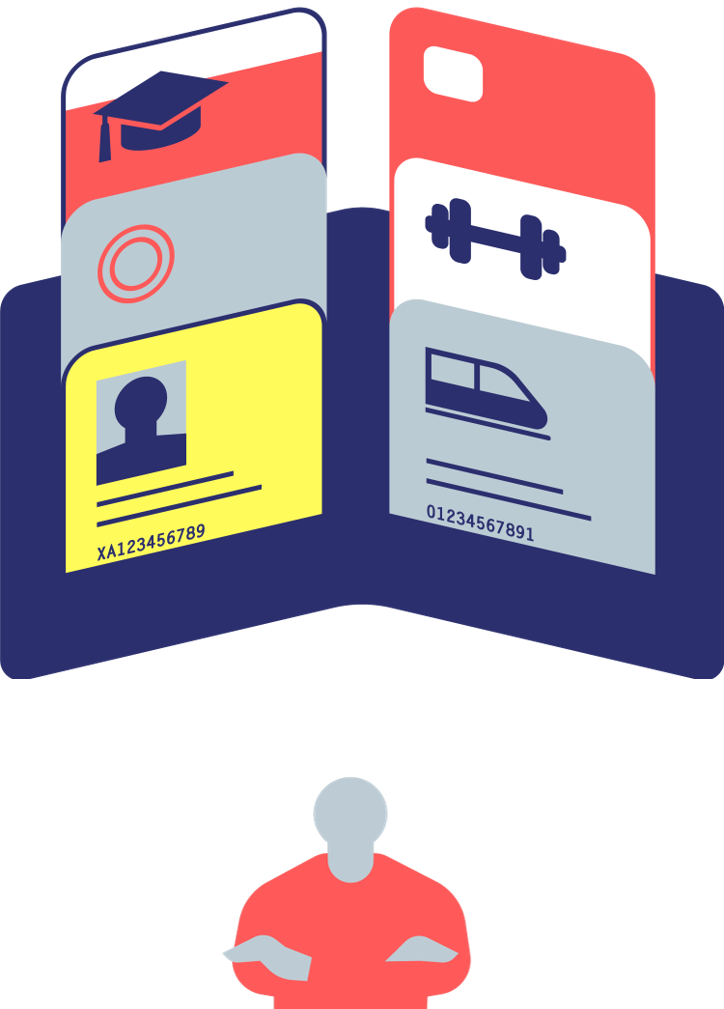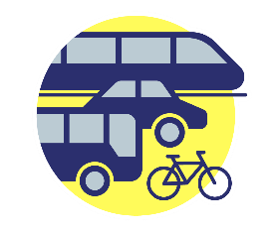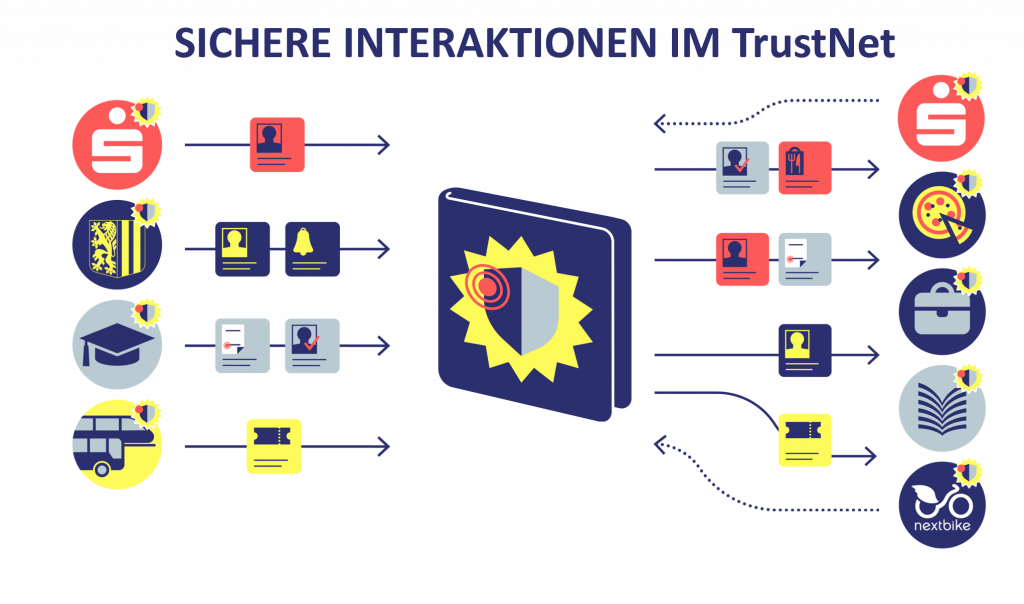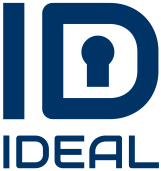About the project
What is ID-Ideal?
The average modern person has around 70 digital identities. Managing these many digital identities and maintaining control and security over their own data linked to these identities is impossible for most people according to the current state of technology.
Der Charme der Idee, diese vielen IDs durch eine einzige sichere digitale ID zu ersetzen, steht den folgenden drei Herausforderungen gegenüber:
the technological feasibility of a secure, trustworthy and data protection-compliant solution
- the intuitive usability of this solution by users without special technical understanding
- Incentivizing ID holders and interaction partners to adopt and use such a solution.
The ID-Ideal showcase project will address these challenges, but will focus on the management of secure digital identities by the respective identity holder. Technological solutions will be developed and demonstrated that enable the holder of a digital identity to once again become the master of his or her own data.


USE CASES
In order to achieve the widest possible dissemination of ID technologies, ID-Ideal implements application scenarios across the entire spectrum of social life. Use cases can be found in the municipal environment, public administration, daycare centers, as well as in private-sector companies, in gastronomy and retail. In addition, processes using ID technologies are also being tested in the energy sector, the areas of networked mobility, campuses and Industry 4.0.
City
Various use cases are being tested in the cities of Leipzig and Dresden. These include digitizing the process of moving within as well as moving into the city. This means that a personal presentation at the citizens' office for a Re-registration process with a verified digital identity will no longer be necessary. But not only the re-registration, also the digital application and the issuance of digital documents and authorizations, such as ID cards, Market stand registration, Library card, Dresden passport or Leipzig App, are to be made accessible in an ID ideal-compatible manner. The existing eID functions of the ID card and eIDAS compliance will be integrated. In addition, integration in citizen participation processes, e.g. participation portal and citizen's decision is being tested, with the use of the Free State of Saxony's citizen participation portal to enable citizen participation via the ID ecosystem in other municipalities as well. Furthermore grant applications in fully electronic form included digital verification of the information provided by the applicant are offered.

Town
In the city of Mittweida, user-friendly, trustworthy ID use cases in municipal facilities such as. outdoor pool, school and kindergarten identified and tested. In particular, the use of a secure ID can contribute to communication between parents and daycare centers. The integration of biometric features in authentication processes enables simple and uncomplicated access to premises, such as the swimming pool in Mittweida. In addition, payment at vending machines can be made using ID technology without the need for additional devices.

Mobility
In Dresden sind bereits die Angebote der Mobilitätsanbieter DVB (ÖPNV), Nextbike (Bikesharing) sowie teilAuto (Carsharing) unter der Marke MOBI physisch (gebündelt an MOBI-Punkten) im Stadtraum verknüpft, um das intermobile Reisen innerhalb der Stadt Dresden für Bürger und Touristen zu vereinfachen. Mit Hilfe des in der Entwicklung befindlichen ID-Ökosystems wird es künftig für die Nutzer möglich sein, sich bei einem der genannten Mobilitätsdienste anzumelden und die anderen mit dieser Berechtigung ebenfalls zu nutzen, d.h. Anmelde- , Buchungs- und Abrechnungsprozesse vereinfachen sich. Zugleich wird dadurch die Ad-Hoc-Anmeldung wesentlich vereinfacht sowie die Abrechnung für alle Beteiligten schlanker.

Trade
In the retail scenario, digital coupons for retailers as well as restaurateurs in the showcase region are implemented in the form of customer cards, stamp cards, loyalty cards and customer-specific offers using ID technology. Here, too, the focus is on the customers. The aim is to involve customers transparently and fairly in the business with their data. In addition, the provision of trustworthy data on products from the manufacturer to the end consumer is to be retrievable in the form of transparent product certificates.

Industry 4.0
In the Industry 4.0 scenario, the rental processes for machines such as industrial trucks are simplified using the new ID technology for both the hirers of the machines and their lessors. In the course of this, new cooperative business models are being tested. For example, in industrial parks and exhibition centers, machines are to be made available for flexible use by different tenants.

Energy
Das Arbeitspaket „Energie“ nutzt selbstsouveräne Unternehmens-, Maschinen- und Personenidentitäten für hochauflösende Herkunftszertifikate für Strom. Entlang der Lieferkette werden diese zunächst beim Stromerzeuger erstellt und dann über die verschiedenen Akteure im Strommarkt bis an die Endverbraucher*innen weitergeleitet. Im Rahmen einer prototypischen Implementierung werden die CO2-Emissionen beim Laden eines E-Autos bestimmt. Die Implementierung erfolgt auf Basis der bereits im bisherigen Projektverlauf konzeptionierten Ende-zu-Ende Architektur, die verifizierbare CO2-Nachweise für Endverbraucher*innen als Grundlage für innovative Geschäftsmodelle und Nachhaltigkeitskonzepte ermöglicht.

Campus
Im Rahmen des Campus-Szenarios werden mithilfe von selbstverwalteten digitalen Identitäten Systemanmeldungen, Schließfachbuchung und -bedienung and Bewerbungen für Studierende und Mitarbeitende vereinfacht. Außerdem soll die Anerkennung von Zeugnissen and Leistungsnachweisen im europäischen Bildungsraum mithilfe von digitalen Prüfprozessen gefördert werden.

Target
ID-Ideal hat das Ziel, eine Basis für bestehende und künftige digitale Identitätsdienste und breitenwirksame Alltagsanwendungen zu schaffen. Die Basis ist das sogenannte ID-Ideal Trust Framework, es regelt die technische, semantische und rechtliche Interoperabilität von Diensten und Anwendungen. Es soll die Entstehung eines ID-Ökosystems anregen, in dem vielfältige ID-Dienste koexistieren können. Damit wird der übergreifende Austausch digitaler Nachweise möglich, was Vertrauen zwischen den Akteur:innen im digitalen Raum schafft. Die zu erarbeitenden Lösungen bleiben jedoch nicht in der Region, sie sollen das Fundament für eine deutschland- und sogar europaweite Anwendung einer selbst souveränen digitalen Identität bilden. ID-Ideal setzt dabei auf einen methodischen Dreiklang aus einem Regelwerk für Interoperabilität (ID-Ideal Trust Framework), Anreizsystemen für eine breite Nutzung (Datenökonomie, Usability und Geschäftsmodelle) und einer Community für den Transfer (Trustnet-Initiative).

